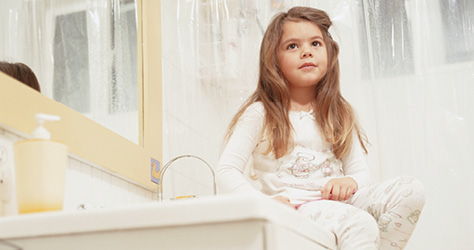Helping your little one stay dry at night time
Once they’re out of nappies in the day, take a deep breath: the next step is night-time training. Here’s some advice to help everyone stay sane.
At a glance
- When is the best time to start
- Top tips for success
- How to deal with accidents

First off - do not worry!
Don’t worry if you've left a gap between daytime potty training and getting them dry at night. This is completely normal: most pre-schoolers aren’t toilet trained at night until aged three or sometimes nearer four.
And if you've both had a bit of a fraught time potty training it can be a good idea to leave a few months for things to settle down again and for your pre-schooler to get really confident about their new life in pants.
When to start
You’ll know when the right time is to start. Sometimes your little one will suggest the idea of ditching the night-time nappies. Say yes quickly and go for it while their enthusiasm lasts: getting your toddler or pre-schooler on board is the key to all potty training success.
The other sign is that their nappies are dry or nearly dry for several nights in a week. That means they’ve got the physical maturity to go a whole night without weeing. However, this is not always a reliable indicator - sometimes they use their night nappy for an early morning wee because they know it’s there, which is perfectly logical.
If you think the time is right, and certainly if they are over three and a half, bring up the subject: have a low-key conversation about leaving off the nappies or pull-ups, and say you think they are old enough to go to the loo or use the potty at night.
How to prepare
Before you start it’s really worth buying a plastic mattress protector (an old shower curtain will also do the job). Just like daytime training, accidents will happen, only this time there’s more potential for collateral damage than just Spiderman pants and floorboards.
And as it’s going to be the middle of the night when you’re changing sheets and pyjamas, you don’t want the added stress of worrying about ruined mattresses. Being relaxed about accidents is the key – which can be harder at 3am than 3pm. Explain to them that accidents don’t matter and that you can easily change their sheets.
To prepare, cut back on evening drinks – especially if they’re still having a drink of milk before bed. It can be a good idea to have the last drink with tea, then just a sip of water later if they’re thirsty.
Put a potty by the bed and make sure there’s a landing light or bedroom nightlight on so they don’t panic if they have to get up.
What to expect
They’re all different, but it’s pretty likely you will have a week or two of disturbed nights and wet sheets – sometimes more than one a night. You’ll also get the odd accident after that, especially if they are ill or upset. In fact it’s not uncommon for five and six-year-olds to wet the bed regularly. This is called enuresis; it runs in families and is more common in boys.
At the beginning if they’ve managed to stay dry, praise them but don’t hype the whole thing up too much or they may feel they’ve let you down if they have an accident the next night. Stay calm and don’t comment on changing wet sheets at 3am, and again at 5am... It’s a good idea to have a pile of sheets and any spare duvets, blankets, towels etc by their bedroom door to minimise frantic night-time searches through cupboards.
Lifting
Some parents swear by lifting their child out of bed around the time they themselves are going to bed, around 11pm, and popping them on the loo or potty so they won’t need a wee later. The experts are divided about this: some say it’s only useful as a learning exercise if they’re totally awake.
A reward chart can be a good idea if you want to sharpen their resolve (a sticker for a dry night, then a present after seven dry nights, for example). But if they’re trying their hardest and still getting lots of accidents, having a reward system can make them feel they’re failing.
Sometimes we have to accept that things take time, and being patient and understanding is the best way to get results.
For more information on enuresis and bed-wetting contact the support group Enuresis Resource and Information Centre (ERIC) via their website or their Helpline: 0845 370 8008